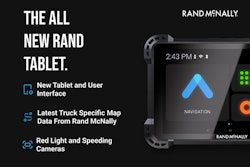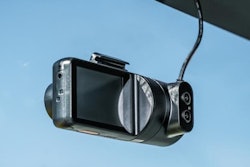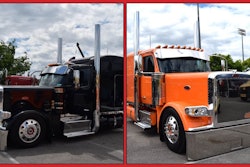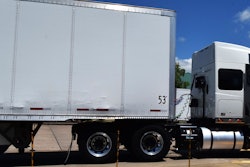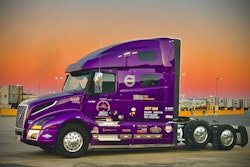The Transportation Intermediaries Association, the main trade group for freight brokers and 3PLs, has taken up what they hope will be an industry-wide fight against freight fraud, admitting that scammers are hurting their business and reputation. The fight isn't exactly going their way just yet.
A recent, 40-page "Framework to Combat Fraud: Preventing & Responding to Fraud and Theft" document from TIA states that freight fraud has skyrocketed 600% from November 2022 to March 2023 and lays out case studies of five different types of thefts, including ways to prevent or address them.
Each of the five types comes with a checklist of recommendations for prevention, which range from four to 12 steps long. Overall, the recommendations include common sense due diligence, things like verifying carrier addresses and MC numbers a few times a year, practicing robust cybersecurity, and communicating with shippers to make sure the right truck shows up for the right load and there's no last-minute change-ups that indicate the potential for cargo or financial theft about to occur.
[Related: Double brokering scourge: How it works, how to fight back]
If every broker, shipper and carrier double- and/or triple-checked the moves and claims of every party to every load, every time, might trucking find itself waking up from the current fraud nightmare? Might the entire freight industry not only stamp out double brokering but also zero in on ID thieves looking to make off with whole truckloads of product and scammers looking to glean inside information?
As the 40-page framework makes clear, and TIA freely admits, brokers, carriers and shippers alike make mistakes, and there's more that needs to be done to correct the errors.
Transaction speed makes brokers and carriers their own worst enemies
The TIA document acknowledges that, in some ways, the huge fraud problem lies in the structures around freight brokering.
“Every day we expose ourselves to many risks in our businesses,” wrote TIA Fraud Taskforce Chairman Dan O’Sullivan in the document. “We are trusting people that, in most cases, we have never met to move products around the country that are worth exponentially more than the rates earned for moving those products. How we manage those risks improves our bottom lines and protects our customers.”
That, plus the lightning speed with which freight (especially good-paying loads) moves from load boards, clouds the prospects of universal double- and triple-checking, much less brokers moving in lockstep with the four- to 12-point checklists recommended by the updated TIA framework.
"TIA has been trying to tackle the issue of fraud in multiple different ways," said Chris Burroughs, vice president of government affairs at TIA. "One of those is internal education and guidance for our members. One piece of those efforts is putting together this fraud framework."
Now in its third iteration, the framework offers "a snapshot" of fraudsters' new methods, said Burroughs. "Criminals and fraudsters have become more sophisticated. The types of fraud have been more thorough and organized."
At the very least, no TIA member can say they haven't been warned about the dangers of double brokering and other freight fraud, whether the likelihood of theft of money or of the cargo itself.
"None of these strategies are a silver bullet," said Burroughs, acknowledging that without meaningful enforcement or new regulatory muscle aimed at the problem, brokers alone will never be able to stamp out the various frauds. "We’re obviously cognizant of the fact that [the framework] is not the Holy Bible of preventing fraud. The criminals have to be right just one time and it’s game over for the brokers and game over for the carrier that may have been involved, who may be three or four double brokers down the line and doesn't get paid."
For 100% prevention, "our members have to get it right 100% of the time," he said. "The situation we often hear from our members is 'we didn't follow the procedures.' It's just the typical 5 p.m.-on-a-Friday load that falls through the cracks."
Load boards, also TIA members, make mistakes, too. At a recent TIA conference, Burroughs noted, leaders from DAT and Truckstop "spoke at length about what they're doing to combat" freight fraud using "sophisticated technology."
Indeed big load boards and brokers have engaged over the last year and more in public messaging around their anti-fraud campaigns. DAT last year launched multi-factor authentication and a website with security information, among other efforts to increase security of its boards. Truckstop in February boasted about booting nearly 10,000 accounts from the load board over fraudulent activity.
But over that same period, cargo theft has climbed 46%, according to CargoNet, and in part the speed and urgency of transactions mediated through online boards drives the trend.
“Well, what the bad guys have figured out is, the faster we move things, the less vetting we do, and the faster they can steal things," said Keith Lewis, CargoNet vice president of operations. "And that’s what’s going on right now. It’s hitting us like lightning. There’s really no end to this.”
The turn to tech tools, in essence, seems to have done little to combat the problem. In part, that's because criminals are tricky and organized. But some carriers and brokers alike have criticized load boards for not taking enough action.
Why don't they simply kick everyone off their platform with an improper principal place of business? The Federal Motor Carrier Safety Administration and various freight fraud vigilantes have identified this as a hallmark of some of the organized double broker networks, though FMCSA has been slow, to say the least, to act on reports of scammy brokers with bad PPOBs.
[Related: 'WTFFMCSA': Carriers mocking the agency through its own registration system?]
Burroughs said the load boards are trying, but added more work could be done.
"They’re taking [freight fraud] very seriously and taking appropriate steps while dedicating a lot of time, resources and money to combating this issue," he said. "But everyone in the supply chain has a duty to address this, and there's more we could be doing."
Brokers hate double brokers, too
Jordan Backes is director of logistics at ADM Logistics, a shipper of food products that also offers brokerage services. Backes believes the double brokering problem poses something of a "change or die" threat to the entire industry.
"Obviously I think the biggest thing in the industry now from a broker and a shipper's point of view is definitely double brokering," Backes said. His experience as a broker and shipper at a Fortune 500 company exposed him to direct financial and reputational risks, constantly expanding as load boards increasingly become the wild wild West for freight fraud.
According to Backes, the threat of double brokering isn't just coming from malign outside actors. Like the old horror movie, sometimes the call comes from within the house.
"We're seeing brokering to carriers with authority and broker authority," he said. Increasingly, loads tendered to previously trusted carriers, "sometimes carries who we’ve trusted for years and have great relationships with, who have hauled hundreds if not thousands of loads for us," turn into double, even quadruple-brokering situations.
These carriers and/or brokers often blame the fraud on "a rogue employee taking advantage," and then say they've fired the employee, only to have fraud crop up again, according to Backes. "When it gets to the carrier who eventually hauls the load" and doesn't get paid, "that’s when we hear about it, months down the road. And when we get the rate, the rate is 20-30 percent higher than we originally booked it. ...
"We’re the ones getting sued for this, it's our reputation on the line."
Now, on a "weekly basis" ADM gets contacted by unpaid carriers or confused shippers/receivers on the wrong end of a double broker's scheme, he said. "We already paid the carrier that was supposed to haul the load, and now we have to pay again and pay extra on top of that just to get the situation right."
ADM does pay carriers scammed out of payment by double brokers. Other brokers might not. In the recent double brokering dustup at Uber Freight, the broker tried for weeks to get out of paying just such a carrier, despite an Uber employee directly telling the carrier to go ahead and haul the load after being confronted with BOL details that just didn't add up. (The broker did ultimately end up paying weeks later when confronted by a debt collector.)
[Related: FMCSA forces transparency from Uber Freight after double brokering scam uncovered]
Adding insult to injury, ADM specializes in fresh food and other reefer loads, so losing the chain of custody can cost the company dearly.
"From a broker’s standpoint, government intervention is a scary word to us," Backes said. "There's a lot of things on the books like rate transparency that could destroy brokerages -- I don’t want that."
Putting on his shipper's hat, though, he said, "we just want to make this right. We can't afford to lose custody of our food product, not all the instructions get followed down the line. We're seeing broken seals and things getting transloaded. We're having to reject loads."
Backes took his concerns to TIA, which in part prompted the updated framework document.
"Something’s got to give. Someone in the market has to fix this," said Backes.
Asked if the growing double brokering plague was a threat to the freight broker's business model long-term, Backes said "absolutely. Any time anything with the word brokerage has a negative connotation it hurts our image for sure. On calls with new customers, the first thing they’re talking about is 'make sure you don’t double broker this and make sure you have proper setup processes.'"
As for a principal vector of attack for criminals, load boards, Backes said ADM has set up its own internal board, and that he sees the same two big problems as anyone else. Namely, those false principal places of business in entities' registrations, and commonality in ownership (one email, phone number or name controlling dozens of duly authorized carrier and/or broker entities). The internal ADM load board, however, is closed to carriers with fewer than three years of history with authority, posing a big problem for new entrant companies.
New legislation to 'hold FMCSA's feet to the fire?'
Ultimately, TIA's Burroughs said he supported recent FMCSA efforts to begin overhauling its registration system, and would like to see regulations on the books enforced. Burroughs said TIA, the Owner-Operator Independent Drivers Association and the American Trucking Associations had all come together for work on a new piece of legislation he thought would "really hold FMCSA's feet to the fire" on enforcing its commercial regulations, enabling civil penalties (fines) to be levied against entities with problematic business addresses and other registration issues.
Following initial publication of this story, that legislation was introduced in the House of Representatives.
He gave the example of a $10,000 fine for brokering without proper authority. Might that put teeth into FMCSA's enforcement efforts?
Whatever the case, given brokers now feel the heat from shippers over the issues, both Burroughs and Backes saw brokers and carriers aligned. "These carriers did a job, they deserve to paid for the job," Backes said of carriers stiffed at the end of a chain of brokers. "We’re hemorrhaging money, but we do the right thing. I don’t see this as truckers against brokers or shippers against brokers. We've all got to work together to fix it. Let’s be on the same team."
[Related: Broker margins, rates data, transparency: What owner-operators really think]

